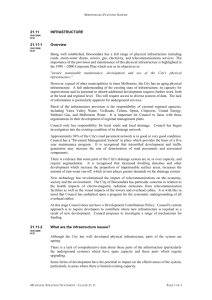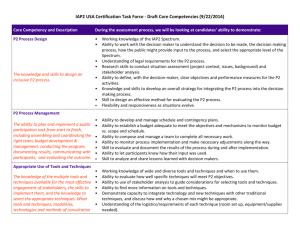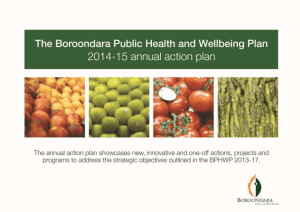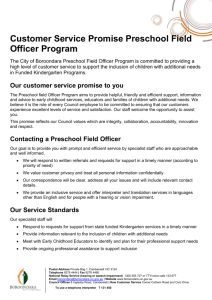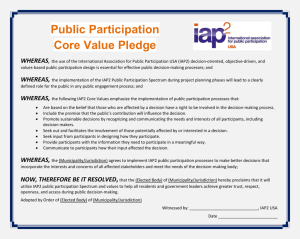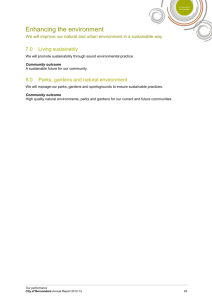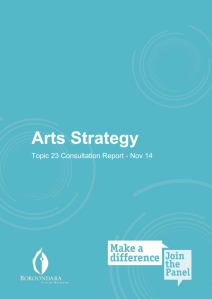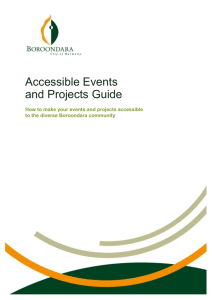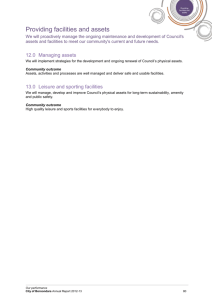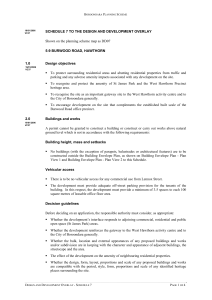Community Engagement Policy 2015-20
advertisement
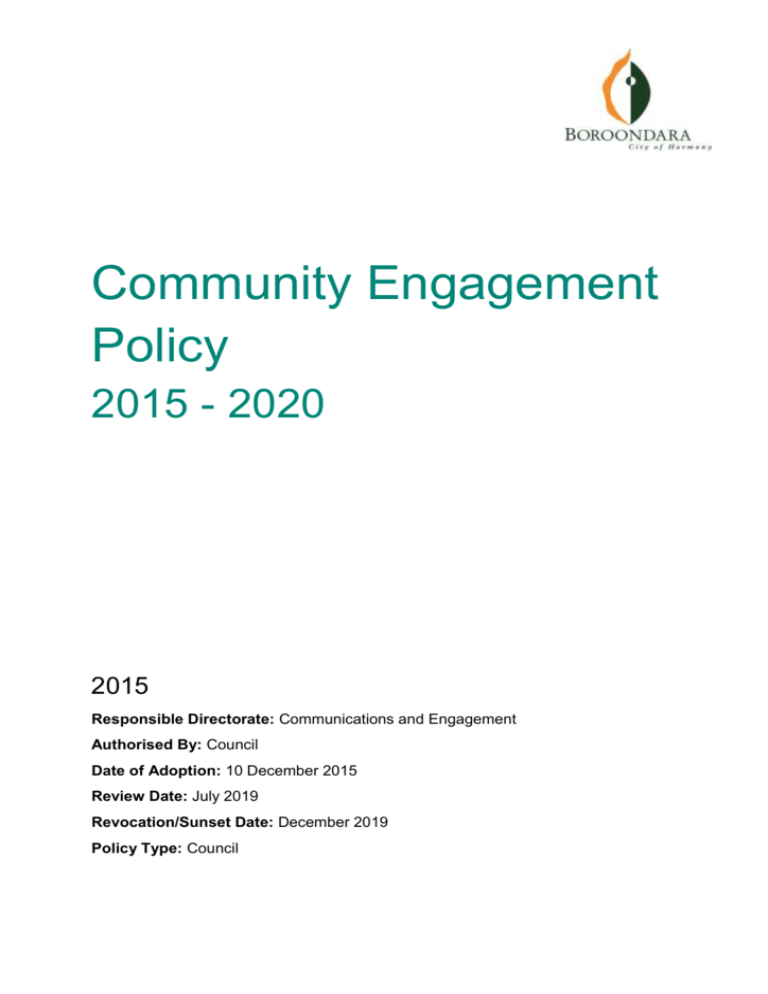
Community Engagement Policy 2015 - 2020 2015 Responsible Directorate: Communications and Engagement Authorised By: Council Date of Adoption: 10 December 2015 Review Date: July 2019 Revocation/Sunset Date: December 2019 Policy Type: Council Table of contents 1 Purpose................................................................................................................ 3 2 Context................................................................................................................. 4 2.1 Legislative context ....................................................................................... 4 2.2 Strategic context .......................................................................................... 5 3 Scope ................................................................................................................... 6 4 Policy Statement .................................................................................................. 7 5 Community Engagement...................................................................................... 8 5.1 What is community engagement? ................................................................ 8 5.2 The Principles that underpin community engagement ............................... 11 5.3 When to engage ........................................................................................ 12 5.4 How to engage ........................................................................................... 13 5.5 Reporting ................................................................................................... 15 6 Implementation and evaluation of the Policy ...................................................... 15 Appendix: 1. Methodology ...................................................................................................... 17 2. Definitions .......................................................................................................... 18 3. References......................................................................................................... 18 Attachment A - Community Engagement Matrix ....................................................... 20 DRAFT Community Engagement Policy 2015 2 1 Purpose The purpose of Community Engagement Policy is to outline Council's commitment to, and approach to community engagement. The Policy is founded on a belief that participation in civic life is central to good health, developing strong and supportive networks and creating a positive community spirit. The Policy outlines how Council will fulfill its commitment to create genuine and transparent opportunities to enable community members to provide feedback about matters of interest to them through Council’s decision-forming process. We recognise that a community engagement program involves our community through the provision of information or through shared problem solving, and uses community feedback to inform decisions that meet the current and future needs of the Boroondara community. This Policy: outlines the Principles that guide community engagement in Boroondara sets out how and when community engagement activities are undertaken by Council staff outlines a community engagement approach based on industry standards for sound public participation promotes consistency of approach across Council to ensure all communities receive the same opportunity for engagement and participation promotes sustainable decision making, in order to achieve well informed and well made decisions accepted with confidence by an engaged community encourages a complete process in consultation activities that includes report back to community. DRAFT Community Engagement Policy 2015 3 2 Context There are a number of factors that drive the need for Council to continuously improve its community consultation and engagement practice: 2.1 increasing community expectation to be actively involved in democratic processes the opportunity to promote an organisational culture of consultation and engagement across Council the opportunity to promote consistency of engagement practice across Council, particularly regarding process and how feedback is provided to the community developments in the way people communicate and can be engaged through technology; social media and other online interactive mechanisms increasing complexity of public policy issues which, increase the need to provide information to the community about the complexity and to hear back from different voices. Legislative context The Local Government Act 1989 states that a role of Council is to provide governance and leadership for the local community through advocacy, decision making and action. The primary objective of a Council is to endeavour to achieve the best outcomes for the local community having regard to the long term and cumulative effects of decisions. In making decisions, Council holds the responsibility to take into account the diverse needs of the local community. Under the Local Government Act, the ‘local community’ includes: people who live in the City of Boroondara people and bodies who are ratepayers people and bodies who conduct activities in the City of Boroondara. Victorian Charter of Human Rights and Responsibilities Act 2006 The Charter is about the relationship between government and the people it serves, and sets out the basic rights, freedoms and responsibilities of all people in Victoria. The Victorian Charter of Human Rights and Responsibilities Act 2006 enshrines the human right to take part in public life, stating that “every person has the right to take part in public life, such as the right to vote or run for public office.” DRAFT Community Engagement Policy 2015 4 2.2 Strategic context Council Plan 2013-17 The Council Plan 2013-17 outlines the way Council seeks to achieve goals for Boroondara over the four-year Council term. The Council Plan describes five themes that outline key focus areas for Council services. The Community Engagement Policy supports the theme, ‘Strong and engaged communities’, with particular reference to the strategic objective: Our community has a say in matters of interest to them in achieving Boroondara’s vision. The associated strategy for the accomplishment of the strategic objective states: We will develop and offer a range of communications and engagement opportunities to meet differing and emerging community need. The strategy is designed to achieve ‘Council information and services [that] meet community expectations and an organisation that demonstrates its culture of engagement’. City of Boroondara Public Health and Wellbeing Plan 2013-17 Municipal public health and wellbeing plans are legislative requirements under the Victorian Public Health and Wellbeing Act 2008. The City of Boroondara Public Health and Wellbeing Plan 2013-17 is a four-year strategy that sets the broad mission, goals and priorities to protect and promote municipal public health and wellbeing. The Community Engagement Policy supports the Theme 4, Best practice health and wellbeing planning and leadership. The Community Engagement Policy will contribute towards the City of Boroondara Public Health and Wellbeing Plan 2013-17 by involving community members in problem solving in matters of interest to them, using feedback from community members in the decision making process. The Policy does not contradict or override prescribed statutory consultation processes; nor does it intend to extend, or to create any new, rights of appeal in relation to any prescribed statutory processes. This policy confirms that prescribed statutory processes are a measure of minimum compliance with best practice public participation standards. Consideration should be given to supplementing these statutory processes with other engagement activities along the public participation spectrum. DRAFT Community Engagement Policy 2015 5 3 Scope The Community Engagement Policy has been developed to ensure that members of the Boroondara community have genuine opportunities to participate in community engagement programs about matters that affect them, and to provide feedback to Council that is taken into account by Council when making a decision. This Policy applies to all Council staff and consultants employed as representatives of Council, and have accountability for enacting this Policy through learning, implementation and compliance. Communications and Engagement responsibilities The Communications and Engagement department Executive Manager coordinates the implementation, maintenance and review of this Policy; ensuring stakeholders are aware of their accountabilities. The Engagement and Research Team is an active participant in the delivery of the community engagement culture and practice at the City of Boroondara. The Engagement and Research Team will bring expertise, influence and resources to support departments in the development and delivery of community engagement programs, as required. All staff will be supported by the Engagement and Research Team in being accountable for this Policy. Department responsibilities Department responsibilities include: overall responsibility for the communication engagement program associated costs report back to the community (refer to section 5.4.1). For all queries or feedback regarding this Policy document, please contact the responsible department below. Communications and Engagement: Telephone: 03 9278 4444 Email: engagement@boroondara.voc.gov.au DRAFT Community Engagement Policy 2015 6 4 Policy Statement This Policy describes the role of community engagement in the Council decisionforming process including, but not limited to: strategic projects policy, plan and strategy development service delivery programs major projects capital works. This Policy has been developed to ensure that community members in Boroondara have genuine opportunities to participate in Council decision-forming processes about matters that affect them. As a message to the community, the Policy reinforces Council's commitment to meaningful community engagement and clearly sets out how the community can expect to be engaged by Council. This Policy provides direction to Council staff about identifying when and how to implement a range of community engagement strategies, and the Policy applies whenever any level of public input or participation is sought from the community in relation to Council projects, strategies, plans, programs or service delivery. There is mutual benefit in involving the community in Council's decision making processes. Effective community engagement leads to: better informed decision making greater understanding of decisions made through an inclusive process increased capacity for the community and Council to gain more information, develop skills and confidence in collaborative engagement and decision making processes. DRAFT Community Engagement Policy 2015 7 5 Community Engagement 5.1 What is community engagement? Community engagement is a process not an outcome. It is a process in which the community has a role in Council’s decision-forming process. Taking into consideration community views, opinions and expectations is an important factor in Council’s decision-making. For Council decision-making to be an effective, transparent and accountable process, decisions are made by weighing and balancing community expectations with other factors such as: fiscal responsibility economic considerations health and safety considerations equity and diversity considerations environmental, social and cultural benefits throughout the City. Effective community engagement means providing enough information to the community participants about all the relevant considerations. Effective community engagement will assist Council to identify and explore the needs of our community and as a result make better informed, more publicly accepted and generally sustainable decisions. Representation and participation Engagement processes must be designed to so that views from a representative cross section of the community can be included. This means designing engagement programs tailored to reach those groups within the community whose views are less often heard or who are more difficult to reach through traditional engagement approaches, such as: children and young people aged people from culturally and linguistically diverse backgrounds people with a disability. An aspiration of the Community Engagement Policy is to develop community capacity by providing opportunities for people to gain more information; develop skills and develop confidence in participating in community life, thereby reducing social isolation. An anticipated outcome of the application of the Community Engagement Policy is that more members of our community will feel encouraged to share responsibility for their environment and neighborhoods; build local networks and participate in civic life with a greater understanding of the role of local government. DRAFT Community Engagement Policy 2015 8 IAP2 levels of public participation The International Association for Public Participation (IAP2) is an international member association which seeks to promote and improve the practice of public participation, incorporating individuals, governments, institutions and other entities that affect the public interest throughout the world. The IAP2 Public Participation Spectrum consists of five levels of public participation, which are displayed in Table 1. Council is committed to using the levels of public participation in its community engagement practice to create a shared language for engagement to build community trust and understanding. Council staff will be supported by the Communications and Engagement Team in selecting an appropriate level of engagement for their community engagement programs to ensure they meet the intent of this Policy. IAP2 Public Participation Spectrum This Policy direction is consistent with, and based upon, existing industry frameworks for public participation with particular reference to the International Association of Public Participation (IAP2) Spectrum. Council refers to the IAP2 Public Participation Spectrum, which is designed to assist with the selection of the level of participation that defines the public's role in any community engagement program. The Spectrum is a framework that helps with the selection of a level of participation that defines the public's role in any public participation process, and shows that different levels of participation are legitimate in decision-forming processes. The level of participation is normally selected when developing the engagement program methodology. Council uses the Spectrum to reflect international best practice; however within the context of local government, final decisions are made by Councillors as the elected representatives of community. The Empower level of public participation is described by IAP2 as “to place the final decision-making in the hands of the public”. Within the legislative context of local government it will be rare for decision making power to be devolved fully as Council will maintain final responsibility for this. However aspects of decision making may be devolved within clear parameters The Spectrum is available as a tool, and does not represent a process of participation. The choice of a specific level of participation depends on the goals, time frames and resources in the decision to be made. DRAFT Community Engagement Policy 2015 9 The IAP2 Public Participation Spectrum INFORM CONSULT INVOLVE COLLABORATE EMPOWER Public Participation Goal Public Participation Goal Public Participation Goal Public Participation Goal Public Participation Goal To provide the public with balanced and objective information to assist them in understanding the problems, alternatives and/or solutions. To obtain public feedback on analysis, alternatives and/or decisions. To work directly with the public throughout the process to ensure that public concerns and aspirations are consistently understood and considered. To partner with the public in each aspect of the decision, including the development of alternatives and the identification of the preferred solution. To place final decision-making in the hands of the public. Example Tools Example Tools Example Tools Example Tools Example Tools Fact sheet Survey Workshop Web site Public comment Online wiki Focus group Working group Open house Citizen advisory committee Consensus -building By decision of Council. Table 1: IAP2 Spectrum for Public Participation (represented to reflect the City of Boroondara context) DRAFT Community Engagement Policy 2015 10 5.2 The Principles that underpin community engagement Application of this Policy will guided by the following principles: Inclusiveness Creating genuine opportunities for all members of the community to participate meaningfully in a range of ways. Transparency Aiming to engage with the community wherever possible before a decision or change is made and being clear about the purpose for, as well as the levels of engagement being used. Accessibility Providing enough information in culturally and linguistically appropriate ways as well as conducting activities in easy to get to locations. Neutrality Conducting our processes fairly, without judgment or bias. Integrity Being clear about how decisions will be made. Diversity Encouraging broad and representative participation in community engagement processes. Equity Listening to all views, opinions and ideas before coming to a conclusion. Accountability Explaining how the information obtained will be used in the decision forming process and communicating the final outcome. Applying the Principles will support Council in complying with the Victorian Charter of Human Rights and Responsibilities Act 2006. In the Charter both 'freedom of expression' and 'opportunity to take part in public life' are rights that are expressly protected. DRAFT Community Engagement Policy 2015 11 5.3 When to engage The Community Engagement Policy is intended to promote planning for community engagement as part of any project planning process. Emphasis is placed upon the benefits of planning for community engagement as part of the initial whole-of-project planning stage to better manage timeframes, cost and resources associated with engagement. Good engagement takes time, preparation and resources. Community engagement is intended to support good project outcomes. Council may offer an opportunity for community engagement when: reviewing existing strategies and proposing a change in strategic direction substantially changing or reviewing a service, program or project proposing a new policy or strategy proposals for changing the way in which public space looks or is used making rules or regulations that govern the use and enjoyment of public space major projects urban redevelopment proposals, such as structure plans, to significantly change the existing amenity or characteristic of an area capital works projects including public buildings, centres or other infrastructure. Opportunities for community engagement may also arise when: the community raises an issue with Council for a decision (or outcome) and there are likely to be competing community interests the proposed change is likely to generate significant community outrage (strong and mixed views) Council needs more information on which to make an informed decision. an issue may significantly affect the community in terms of economy, lifestyle, environment or amenity of the municipality. DRAFT Community Engagement Policy 2015 12 5.4 How to engage The following 12 step process is based on a best practice approach to stakeholder engagement, the AccountAbility Stakeholder Engagement Standard1. It is intended that the term 'stakeholder' in this Policy represent a broader definition than an individual or group with a special or particular interest in an issue; and is extended to also incorporate both the broader community as well as Council staff as Council stakeholders. Setting out the process as part of the Policy is intended to promote a consistent approach to community engagement for whoever is the relevant ‘community’. Setting out a generic process also allows the community to be clear about what they can expect from Council; however it is acknowledged that community engagement is not a 'one size fits all' process and application of the Policy needs to be flexible depending on the issues involved. Outlined below is the generic process for planning, implementing and reviewing community engagement activities. Plan Do Review 1. Establish purpose 6. Organise resources 10. Community feedback 2. Define scope 7. Invite participation 11. Report back 3. Identify stakeholders 8. Provide information to participants 12. Evaluate process 4. Develop methodology 9. Conduct engagement activity 5. Set timeframes 1 AccountAbility works to promote accountability innovations for sustainable development. The AA1000 Stakeholder Engagement Standard (Exposure Draft) advances the right of stakeholders to be heard, and the organisations’ obligation to adequately respond to their concerns. It provides a principles-based, open source framework for quality stakeholder engagement. It offers a robust basis for designing, implementing, evaluating and assuring the quality of stakeholder engagement. DRAFT Community Engagement Policy 2015 13 Developing a community engagement program Within each of the three categories described above, Plan, Do and Review, Council staff will be faced with the need to make decisions about approach. This Policy recognises that each community engagement program is different and that staff will be called upon to select the most suitable approach at each step when developing a program. The AccountAbility Standard states that successful engagement depends upon understanding ‘why engage?’ (the purpose), ‘what to engage on’ (the scope), and ‘who needs to be involved’ in the engagement. Clarity in these three initial steps will help Council staff to make consistent choices at subsequent steps. It may however be necessary to return to an earlier step in the process if circumstances change. Engagement activities The changing character of the Boroondara community requires Council to develop and implement targeted and creative approaches to engagement. Selection of engagement activities should be designed to meet the particular needs of stakeholders and be accessible to maximise participation. Staff are encouraged to identify any barriers to participation faced by community members and consider ways to reduce those barriers to enable participation. The activity should be designed to address the defined purpose of engagement and gather the data required to inform decision making. The Boroondara Digital Plan 2014-2017 aims to inspire people to get involved with their community by making [digital options] accessible, fun and influential. Staff are encouraged to make creative use of digital engagement strategies. Social media can engage with community members who are less able, or less inclined, to engage with Council through traditional methods. An engagement activity that uses social media should also consider approaches to engage with the segments of the community who do not use digital media. 5.5 Reporting Reporting back to the community closes the feedback loop. The report recognises and respects the contributions made by community members, the expertise and experience shared and the time taken to participate. Capturing and reporting feedback demonstrates that the consultation activity was taken seriously and that community members were listened to and heard. The report back process is an important step in the community engagement process that: builds confidence in process shows participants that their views have been accurately represented stimulates interest in participation in consultation activities. DRAFT Community Engagement Policy 2015 14 Community members are interested to know how their feedback will affect the final decision. Feedback about the final decision may use the structure: What we asked… What you said… What we did… This simple structure demonstrates: the clear purpose of the consultation that community feedback was heard and acknowledged how community feedback informed the final decision made by Council. The timely and accessible provision of a report maintains community interest and momentum around a program. Council uses a variety of report back formats and staff are encouraged to select a report format that is consistent with the consultation approach used in the community engagement program. A report may, for example, use the format of: a letter to the stakeholders involved in the community engagement program a draft strategy, plan or policy an ‘at a glance’ overview key findings and next steps a corporate report format a video a Council report. Council staff will be supported by the Communications and Engagement Team to select a reporting format, and will be supported to prepare a Community Engagement Report when required. However it is the responsibility of the department project team to complete the report. 6. Implementation and evaluation of the Community Engagement Policy Implicit in this Policy is a commitment to continuous improvement to further promote an organisational culture of community engagement. Implementation Implementation will be supported by the Communications and Engagement Team through: staff training sessions development of a consultation register to track community engagement programs capacity building through partnership in engagement program development the online Community Engagement resources and toolkit. DRAFT Community Engagement Policy 2015 15 Evaluation Evaluation of the Policy will be conducted through internal review. The evaluation activities will allow Council to meet its commitment of best practice community engagement by responding to evolving needs and expectations. Community satisfaction with the Policy will be monitored through community engagement activities and at the Policy Review Date. DRAFT Community Engagement Policy 2015 16 Appendix 1. Methodology The Community Engagement Policy 2015-20 builds upon, and replaces, the Community Engagement Policy 2010-12. This Policy was informed by three stages: Community cosultation Staff feedback Community Engagement Policy 2015-17 Desktop research Community consultation Community members were invited to provide feedback through an online survey via the Your Say website, which was promoted in the Boroondara Bulletin. The survey was also available on ekiosks located at the Ashburton Library, the Belmore Recreation Centre and the Hawthorn Aquatic and Leisure Centre. Community members were invited to share views and provide feedback at a facilitated workshop. Staff feedback Staff feedback was sourced through: the Internal Satisfaction Surveys conducted in 2012, 2013 and 2014 a series of meetings conducted with staff across Council an online survey available to all staff. Desktop research Desktop research included a detailed study of the community engagement policies in seven Inner Melbourne municipalities. Literature available through key research centres was also consulted. DRAFT Community Engagement Policy 2015 17 2. Definitions Community People who live in the City of Boroondara, people and bodies who are ratepayers; and people and bodies who conduct activities in the City of Boroondara. Engagement ‘Engagement', as used in this Policy, is a practice, specifically through the development and delivery of a community engagement program. ‘Engagement’ may also describe the broad range of interactions between people, including approaches such as one-way communication or information delivery, consultation, involvement and collaboration in decision-making, and empowered action in informal groups or formal partnerships. Stakeholder 3. The term 'stakeholder' in this Policy represents a broader definition than a group with a special or particular interest in an issue; it is extended to include the broader community and Council staff as stakeholders. References AccountAbility (2015). AA1000 Stakeholder Engagement Standard (AA1000SES). Retrieved from http://www.accountability.org/standards/aa1000ses.html City of Boroondara (n.d.). Boroondara Digital Plan 2014-2017. Herriman, J. (2011). Local Government and Community Engagement in Australia. Working Paper No 5. Australian Centre of Excellence for Local Government, University of Technology Sydney. International Association of Public Participation Australasia (n.d.). The IAP2 Public Participation Spectrum. Retrieved from: http://www.iap2.org.au/resources/iap2spublic-participation-spectrum State of Victoria, Department of Sustainability and Environment (2005). An introduction to engagement . Retrieved from: http://www.dse.vic.gov.au/effectiveengagement State of Victoria, Department of Transport, Planning and Local Infrastructure (2015). Local Government Act 1989. Retrieved from: http://www.legislation.vic.gov.au/Domino/Web_Notes/LDMS/PubLawToday.nsf/95c43 dd4eac71a68ca256dde00056e7b/8ce7321ba121d40fca257dbd008309ba!OpenDocu ment Victorian Equal Opportunity and Human Rights Commission (n.d.). Victorian Charter of Human Rights and Responsibilities. Retrieved from: http://www.humanrightscommission.vic.gov.au/index.php/the-charter DRAFT Community Engagement Policy 2015 18 Community engagement is required under the following legislation: Age Discrimination Act 2004 Charter of Human Rights and Responsibilities Act 2006 Disability Discrimination Act 2004 Equal Opportunity Act 2010 Health Act 1958 Information Privacy Act 2000 Local Government Act 1989 Planning and Environment Act 1987 DRAFT Community Engagement Policy 2015 19 Attachment A - Community Engagement Matrix: Public participation levels and techniques for example projects LEVEL OF ENGAGEMENT (IAP2) example techniques INFORM Inform Techniques KEY Onsite sign CONSULT Open House briefing or display Events Day in the park Fete / Fair drop in Survey C1 C1 Y C2 Y C1 Y = approach is recommended Focus Group INVOLVE Online blog Online forum or wiki Working Group Fish Bowl COLLABORATE Workshops or opinion polls Citizen panels Design charrette EMPOWER Plan4 Real C1 = strongly encouraged to consider approach C2 = consider approach Blank = N/A General Project type Specific Project type Plans Master – local level application Low impact Review existing – local level application Medium impact Policy Service Strategy Strategy Operational Capital works Operational Parks and Gardens Operational Parks and Gardens Operational Parks and Gardens Operational Local Laws Review existing – local level application Low impact Propose new – local level application Low impact Review existing – regional level application High impact Renewal capital works - road reconstruction Basketball half courts / rebound walls Y Y Y Y service users Y Y C2 C2 Y C2 C1 Y Y Y Y Y C1 C2 C1 Y C1 C2 C1 C1 C2 C2 C2 C2 C2 C1 C2 C2 C1 Y Y immediate street Y Y Y Y Y Y C1 Y Skate parks / skate park elements Y Y Y Y C1 Proposing changes to areas designated as dog off-leash Y Y C1 Y C1 BBQ in regional park C2 C1 C2
